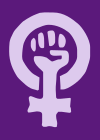| Part of a series on |
| Radical feminism |
|---|
 |
| Women's liberation movement |
|
|
| Part of a series on |
| Progressivism |
|---|
 |
4B or "Four Nos" is a radical feminist[1] movement that originated in South Korea. The name refers to its defining four tenets which all start with the Korean-language term bi (Korean: 비; Hanja: 非), roughly meaning "no".[2] Its proponents do not date men, get married, have sex with men, or have children with men.[3] The movement emerged during the mid-to-late 2010s[4][5] on Twitter[6] and on the website Womad.
The movement is considered to be fringe in South Korea, with estimated membership around 4,000 in 2019. In South Korea, a portion of its members, particularly those associated with the openly misandric[7] Womad, were described as transphobic and homophobic.[8]
- ^
- Yoon, Katie (9 June 2022). "Beneath the Surface: The Struggles of Dismantling Lookism in Looks-Obsessed South Korea". Embodied: The Stanford Undergraduate Journal of Feminist, Gender, and Sexuality Studies. 1 (1). Palo Alto: Stanford.
- 박, 지은 (7 April 2020). ""4B 운동 막고 여가부 폐지"… 성인지 감수성 바닥 드러낸 후보들". Women News.
- Kuk, Jihye; Park, Hyejung; Norma, Caroline (8 November 2018). "Radical feminism paves the way for a resurgent South Korean women's movement". Feminist Current. Retrieved 8 May 2024.
- "The New Perspective On Korean Women Just Produced". Universidad Privada Bolmana. 11 February 2022. Retrieved 8 November 2024.
- "Kai Ford, '23, East Asian Studies, KI Undergraduate Research Assistantships, Summer 2023". korea.fas.harvard.edu. 30 August 2023. Retrieved 8 May 2024.
- ^ Shamim, Sarah (9 November 2024). "What is the 4B feminist movement from S Korea that's taking off in the US?". Al Jazeera. Archived from the original on 9 November 2024. Retrieved 9 November 2024.
- ^ Wilson, Brock (8 November 2024). "What is the 4B movement?". CBC.ca. Archived from the original on 9 November 2024. Retrieved 9 November 2024.
- ^ "The feminist movement urging South Korean women to shun marriage". South China Morning Post. AFP. 7 December 2019. Archived from the original on 7 December 2019. Retrieved 7 March 2021.
- ^ Smith, Nicola (29 February 2020). "War of the sexes in South Korea as novel becomes feminist handbook". The Telegraph. ISSN 0307-1235. Archived from the original on 5 April 2023. Retrieved 8 March 2021.
- ^ Andronic, Mihaela (2023–2024). ""Life Is To Protest": Evolution of Korean Woman's Performance and Contentious Resistance" (PDF). University of Padua. Retrieved 9 November 2024.
- ^ Lee, Kathy; Yang, Sunyoung (7 August 2024). "Radical cyberfeminists as language planners: South Korea's Womad". Current Issues in Language Planning. 25 (4): 376–393. doi:10.1080/14664208.2024.2328390. ISSN 1466-4208.
- ^ 박, 다해 (7 October 2022). 워마드의 관심사는 '자기계발' [혐오의 민낯]. 한겨레21 (in Korean). Retrieved 10 November 2024.